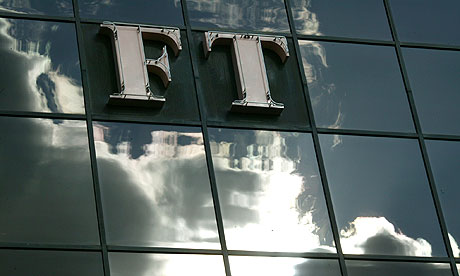
Pearson has reported a 7% year-on-year revenue increase at the FT Group, the division that publishes the Financial Times, as overall sales at the Penguin publisher rose 6% to £2.4bn in the first half of 2011.
Operating profit at the group, which owns an extensive educational publishing division, rose 20% year on year in constant currency terms to £208m.
But sales at Penguin fell 4% despite ebook revenues rising almost 130%.
It said Penguin was working through a period of significant change, with the shift towards digital sales and the intense pressure on physical book sales, and said the digital growth had helped to maintain profits.
The Pearson chief executive, Dame Marjorie Scardino, said: "Though market conditions are anything but easy, we are sufficiently encouraged by our start to the year to raise both our guidance and our dividend.
"Structural changes in our industries are gathering pace, but we are confident that we have the strategy, the competitive positions, the investment capacity and the culture to sustain our strong record of performance."
Announcing its interim results on Friday, the company said the FT Group was well placed to grow even in tough markets for print circulation and advertising. "We expect digital subscriptions, now the engine of the FT Group's growth, to continue to build steadily," it said.
On the back of a better than expected first-half performance, the publisher said it expected its earnings per share to be 80p for the full year, ahead of 77.5p in 2010.
Sales at the FT Group were £203m in the first half of 2011, up from £192m in the same period in 2010. Adjusted operating profit was up £1m to £31m, headline growth of 3% but up 10% in constant currency terms.
Digital subscriptions to FT.com rose 34% to almost 230,000 with registered users up 49% to 3.7 million. Mobile devices now account for 22% of FT.com traffic and more than 15% of new subscriptions.
Rapid digital growth helped maintain profits at Penguin despite the fall in revenue to £457m, with Scardino predicting that people "will carry on reading. I just think they will read differently".
Ebooks now account for 14% of Penguin's worldwide revenue.
"We have been growing in ebooks and other digital programmes exponentially," said Scardino.
"People want to buy a whole book, they don't want to buy a chapter or two. Digital books are a better margin product for us.
"This is just my opinion, but I don't think people are going to read fewer books. We see people buying more books when they buy online, it seems to be an easier thing. I think reading will carry on, I just think they will read differently. That is salutory for us."
Recent bestselling titles from the publisher include Jamie Oliver's 30 Minute Meals and The Brightest Star in the Sky by Marian Keyes. New releases in the second half of this year will include Michael Lewis's Boomerang: Adventures of a Financial Disaster Tourist, and Empire by Jeremy Paxman.
Asked if the company had considered a disposal of Penguin or the FT Group to focus on its core education business, Scardino said: "These discussions go on in any company that is doing the job of running itself. You have to always be thinking about new ideas.
"That said, we do think we are less of a portfolio and more of a company. We are pretty happy that both Penguin and the FT educate business people – at least I hope they do.
"We look at businesses that perform well and perform well in Pearson. These businesses have performed for us over a long period of time; as long as they are high-performing businesses we are interested."
Pearson's north American and international education and professional businesses grew sales by 9% on a constant currency basis to £1.76bn, accounting for 73% of Pearson's total revenue.
Asked about the possible impact on its north American business of the US debt crisis, Scardino said: "It's very strange what they are going through. We don't think it's in anyone's interest not to pay for schools and not to get those sorts of bills paid.
"In the US 90% or more of school spending is done by local government. For a short time at least that would carry on even if America defaulted. That's a possibility that would have so many deeper ramifications for the US I can't really comment on it."
• To contact the MediaGuardian news desk email editor@mediatheguardian.com or phone 020 3353 3857. For all other inquiries please call the main Guardian switchboard on 020 3353 2000. If you are writing a comment for publication, please mark clearly "for publication".
• To get the latest media news to your desktop or mobile, follow MediaGuardian on Twitter and Facebook

